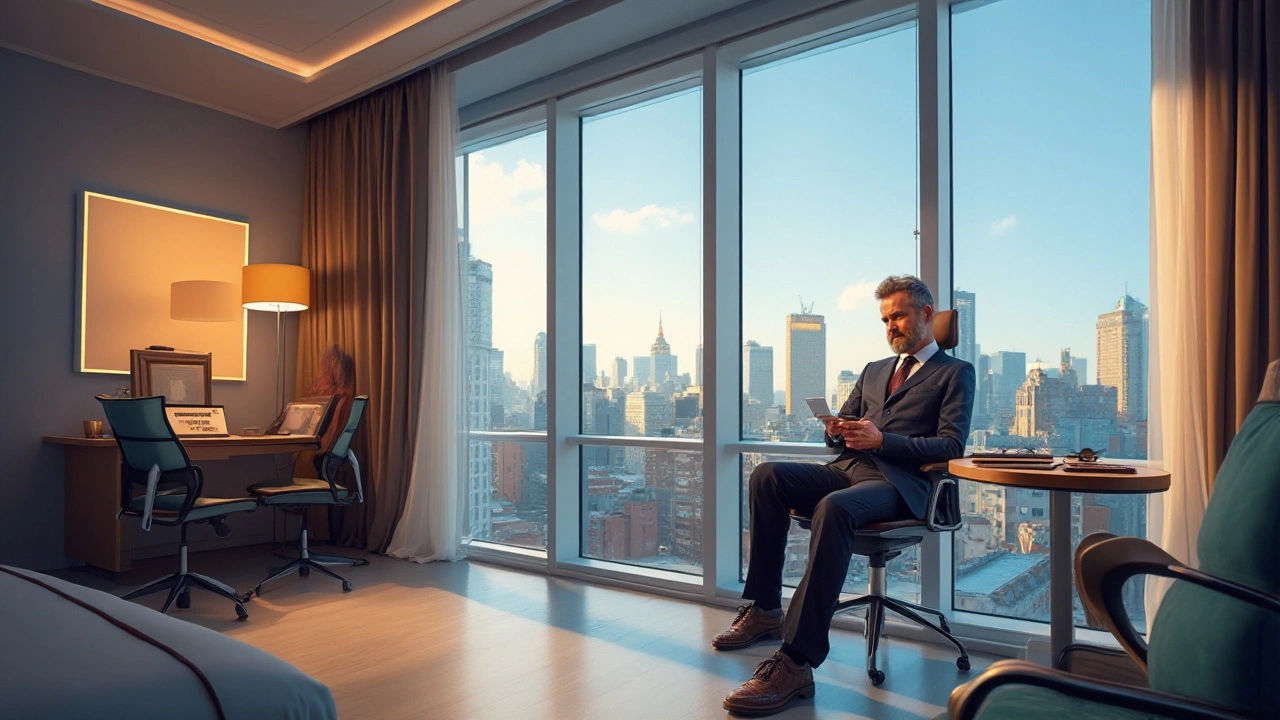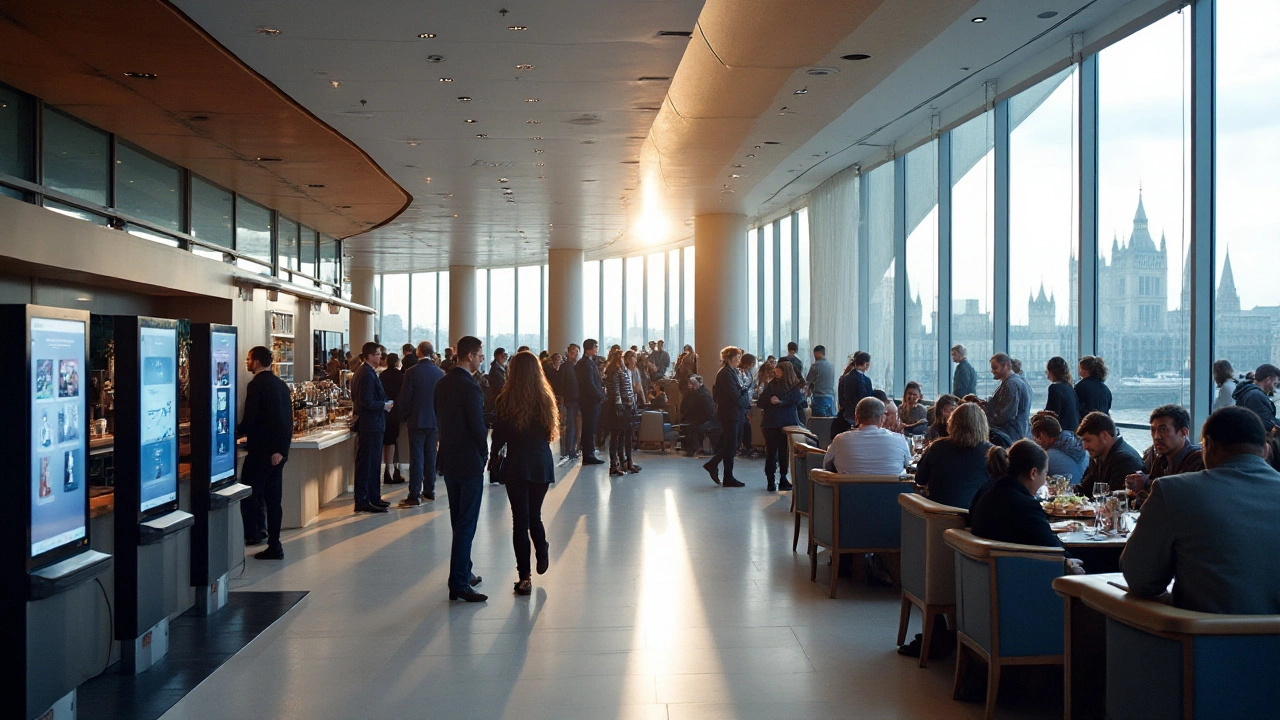In the bustling world of business travel, not all hotels are created equal. Business hotels shine by carving out a unique niche that caters to the specific needs and expectations of professional travelers. What makes a hotel stand out in this competitive sector isn't just its plush bedding or expansive meeting rooms, but something much deeper and nuanced.
It's about creating an environment that seamlessly blends functionality with comfort, efficiency with elegance. It's about understanding the rare breed that is the business traveler, who often juggles tight schedules and high expectations, and anticipating those needs before they even arise. This article delves into what sets these accommodations apart, exploring everything from cutting-edge amenities to the subtle art of crafting memorable guest experiences.
- Understanding the Business Traveler
- Innovative Amenities and Services
- Strategic Location and Accessibility
- Embracing Technology and Sustainability
- Cultivating Local Experiences and Partnerships
Understanding the Business Traveler
Business travelers, often the lifeblood of many hotels, have distinct routines and preferences that differ markedly from those on leisure trips. Known for their packed schedules and high demands, these travelers seek not only a bed to sleep in but an extension of their office environment. A successful business hotel comprehends not just the minutiae of their preferences but also the overarching trends influencing their travel patterns. These hotels prioritize efficiency, catering to the time-starved, results-driven individual aiming to minimize downtime and optimize productivity while on the road.
Business travelers today are more connected than ever, and the need for accessible technology is paramount. High-speed internet, 24/7 connectivity, and robust business centers are more than premiums; they are expectations. It’s noteworthy that recent surveys have revealed that over 80% of business travelers regard free Wi-Fi as a deciding factor when choosing accommodation. Business hotels that capitalize on these needs not only meet the expectations but often exceed them by providing digital concierge services, virtual meeting capabilities, and streamlined check-in/check-out processes via smartphone apps.
"Our guests are always on the go and expect nothing less than the most seamless experience possible," says Marie Owens, General Manager of an internationally acclaimed hotel chain. "We strive to anticipate and meet those needs with precision. Incorporating smart room technologies significantly enhances the stay of a business traveler."
Another crucial aspect of understanding the business traveler's psyche is acknowledging the importance of location. Many business hotels strategically position themselves in proximity to airports, convention centers, and major business districts, slashing transit times and reducing the complexities of commutes. For these professionals, being just a few minutes away from a meeting venue can make all the difference, often influencing their decision when choosing where to stay.
Beyond convenience and technology, a degree of personal touch often resonates with business travelers. The ability to unwind after a long day of meetings is as critical as the day's productivity. Therefore, business hotels offering well-thought-out wellness options, such as yoga sessions, access to fitness centers, or even in-room exercise equipment, provide the perfect balance. Personalization, like customized greetings, preferred newspaper deliveries, or tailored dining recommendations, also plays a significant role in enhancing the guest experience.
Finally, industry experts note a rise in the trend of 'bleisure' travel, where professionals combine business with leisure. This hybrid approach to traveling means business hotels are increasingly crafting their environments to support both work and relaxation. They offer weekend discounts, partner with local attractions, and organize recreational activities, thus fostering a balanced visit. As this trend grows, understanding the ever-evolving needs of the business traveler becomes not just a special touch, but a necessity in ensuring loyalty and repeat business.
Innovative Amenities and Services
A business hotel can transform a routine business trip into an inspiring experience with its innovative amenities and services. Unlike leisure travelers, business guests require tools and services that offer seamless connectivity and unmatched convenience. At the heart of this is high-speed internet, which must be reliable and fast to cater to everything from video conferences to large data transfers. In this digital age, many leading business hotels are stepping up by offering virtual concierge services, which simplify bookings for dinner or transport with just a few taps on a smartphone. The integration of AI, offering personalized recommendations based on previous stays and interests, enhances a guest's experience, making it not only efficient but also deeply personal.
One cannot overlook the necessity of well-equipped workspaces within the guest rooms. Business travelers often need a functional environment where they can focus without distractions. Hotels are responding by providing spacious desks, ergonomic chairs, and universal charging stations that cater to various devices, ensuring that guests can work comfortably and efficiently. Additionally, many hotels are now investing in creating inspiring co-working spaces that encourage networking and collaboration among guests. These shared spaces often come with the added perk of coffee stations and snacks, giving professionals a chance to break the ice and discuss ventures beyond their laptops or emails.
Health and wellness facilities have also become a crucial component of the modern business hotel. The importance of maintaining a routine cannot be overstated, and hotels now offer state-of-the-art gyms, swimming pools, and even yoga or meditation classes to help guests unwind after a demanding day of meetings. Some hotels have gone a step further by collaborating with health professionals to create programs tailored to the needs of business travelers, focusing on mental wellness, stress management, and even bespoke nutrition plans. As a result, guests can maintain a balanced lifestyle, ensuring they are mentally and physically prepared for their work engagements.
"The business traveler today expects more than a place to sleep. They anticipate an environment where their personal and professional needs are met seamlessly," states Angela Brav, CEO of a leading hotel chain.This aligns with the shift towards sustainability, which is now a key element in many hotels' ethos. Implementing energy-saving technologies, reducing waste, and sourcing locally-sourced amenities are practices that not only appeal to environmentally conscious travelers but also help carve a hotel's unique identity in the crowded hospitality market.
To further enhance guest experience, some hotels offer unique services like complimentary ironing of business attire, express laundry, and shoe-shining services, ensuring that their guests always look their best before an important meeting. Some properties even offer car rentals or access to exclusive lounges and networking events, bridging the gap between their guests' professional and personal worlds. Lists of local guides and insider tips curated by the hotel's staff provide guests with an authentic taste of the city, adding unexpected delight to their business trips.

Strategic Location and Accessibility
For business hotels, being in the right place can make all the difference. The importance of a strategic location for these establishments cannot be overstated. Business travelers value proximity to key areas such as financial districts, convention centers, and major transportation hubs. This convenience allows them to minimize travel time and maximize productivity, which is often the primary goal of their trips. Many successful business hotels are nestled in the heart of bustling cities, providing easy access to clients, partners, and essential city resources crucial for a seamless business trip.
Accessibility does not just stop at physical location; it extends to how well these hotels are integrated into the urban infrastructure. Being close to major airports, highways, and public transit can greatly enhance the appeal of a business hotel. A direct shuttle service to the airport or a location within walking distance of public transit can significantly ease the logistics of a business trip. Moreover, hotels that offer comprehensive directions and travel tips can further alleviate the stress associated with navigating an unfamiliar city.
Understanding Market Needs
One of the key aspects of a business hotel's success is its ability to understand and respond to the specific needs of the market it serves. In many cases, this means offering unique locale-specific insights that are invaluable to guests. For instance, a hotel located near a city's tech hub might offer guided tours of local startups or host networking events that cater to the tech industry. Such tailored experiences can transform a functional stay into a professionally enriching experience. A quote from John Smith, CEO of UrbanCross, encapsulates this sentiment beautifully:"The proximity of a hotel to key business areas isn't just about physical closeness; it's about embedding the guest into the very fabric of the local business climate."
Interestingly, studies show that business hotels situated in strategic locations experience higher bookings and longer stays. In a survey conducted by Travel Market Report, it was found that 70% of business travelers prioritize location over other factors when choosing accommodations. This highlights the vital need for hotels to position themselves where they can be the most beneficial to their target clientele, offering not just a place to stay, but a full-fledged base of operations that supports and enhances their business endeavors.
As urban landscapes evolve, so too must the strategic approaches of business hotels. This constant adaptation involves staying ahead of development trends and understanding the shifting priorities of business-centric travelers. In doing so, business hotels maintain their relevance and appeal, ensuring that they never fail to hit the mark for the most discerning of guests. Through careful market analysis and a genuine understanding of traveler needs, business hotels can place themselves at the crossroads of opportunity and convenience, achieving both guest satisfaction and commercial success.
Embracing Technology and Sustainability
As the world pivots towards a more technologically driven future, business hotels are increasingly integrating advanced solutions to keep up with the expectations of a tech-savvy clientele. The fast pace of technological change presents an exciting challenge for hotel managers looking to stand out. Implementation of internet of things (IoT) devices is just one way hotels are revolutionizing guest experiences. From smart room controls to mobile key entry, the technologically equipped hotel is no longer just a luxury but a necessity. This embrace of technology allows business travelers to maintain their productivity regardless of their location, with high-speed Wi-Fi and digital concierge services becoming standard practice. Many hotels are also in step with sustainability trends by adopting eco-friendly technology solutions like energy-efficient lighting and smart climate control systems.
In addition to technology, sustainability has become a significant focus in the hospitality industry, as consumers, including savvy business professionals, grow more conscious of their environmental footprint. Many business hotels are making strategic alliances with green initiatives, ensuring that their operations are as eco-friendly as possible. This includes practices such as using renewable energy sources or implementing comprehensive recycling programs, significantly reducing waste and emissions. In fact, a study by Deloitte noted that nearly half of business travelers think hotels should invest in eco-friendly practices.
The commitment to eco-conscious operations often extends beyond mere regulatory compliance, becoming a vital part of a hotel’s brand identity. The benefits are twofold: reducing overall operational costs while also appealing to a growing demographic of environmentally conscious travelers. One example of this is in the reduction of single-use plastics, with some hotels switching to glass or stainless steel alternatives, which not only minimizes waste but adds a touch of elegance and refinement to a guest’s stay. Often, this focus on sustainability is appreciated not just in the facilities' operations, but in the sourcing of local and organic ingredients for their dining experiences, adding another layer to a guest’s connection to the region they're visiting.
“The hospitality industry is at the forefront of the sustainability movement because many travelers expect hotels to be leaders in environmental stewardship,” said Glenn Mandziuk, CEO of the Sustainable Hospitality Alliance. “Not only is it important for attracting guests, but it’s essential for maintaining profitability in the long term.”
The adoption of both technology and sustainability is not a future trend, but a current essential practice. Evaluation of these elements requires a continuous commitment to improvement and innovation, pushing business hotels to not only keep pace with contemporary demands but also anticipate future changes. By doing so, hotels remain at the cutting edge, delivering personalized, efficient, and environmentally responsible services to their guests. The symbiotic relationship between technology and sustainability within business hotels sets a new standard for the industry, as they navigate the evolving landscape of the 21st century.

Cultivating Local Experiences and Partnerships
When it comes to standing out in the hospitality industry, wise business hotels understand the magic that comes from embedding local flavor into their guests' experiences. A successful business hotel doesn’t just serve as a transactional space where guests lay their heads after a long day of meetings. Instead, it evolves into a living illustration of the locale's culture, history, and unique character. By forming strategic partnerships with local businesses, these hotels can curate memorable experiences that deepen a traveler’s connection to the community and create lasting impressions.
Imagine walking into a hotel lobby, greeted not only by the polite smiles from the hotel staff but also by an open invitation to explore local flavor right within the premises. Many business hotels offer pop-up markets or local artist exhibitions, demonstrating a commitment to showcasing indigenous talent and craftsmanship. This can play a dual role—in fostering local community relations and enriching the guest experience. Hotels often collaborate with local artisans to include handcrafted goods or locally sourced treats in the mini-bar options, subtly introducing their guests to the tastes and textures of the region.
In addition to these partnerships with artisans, cultivating strong ties with nearby culinary experts significantly enhances the guest experience. By aligning themselves with popular local restaurants or renowned chefs, business hotels can design exclusive dining experiences tailored for their patrons. In many instances, you'll find a carefully crafted menu waiting in your room, offering special dishes that you won't find elsewhere. This is a deliberate move, aimed at enchanting guests with authentic local gastronomy—because there's no better way to a traveler's heart than through unique flavors.
Creating tailored itineraries that weave local wonders into a business trip is another effective strategy. By partnering with local tour companies, hotels can arrange bespoke excursions for their guests. Whether it's a wine-tasting tour in a nearby vineyard, a historic city walk led by engaging storytellers, or a wellness retreat in a serene setting, these exclusively crafted experiences add color to what might otherwise be an entirely corporate visit.
From a business perspective, these partnerships can drive mutual benefits by increasing visibility and outreach for both the hotel and its local collaborators. Business hotels that invest in strong local networks report increased guest satisfaction and loyalty, as evidenced in a 2022 survey showing 76% of business travelers preferred hotels with robust local engagement initiatives. In the words of renowned hospitality consultant, Jane Doe,
"The hotels that draw positive vibes from local culture and weave it into their ethos offer precisely what the discerning traveler seeks: authenticity and warmth."
Such symbiotic relationships also represent a sustainable model where both the hotel and the local economy thrive. Indeed, the bridge that business hotels build with their surrounding communities turns transient visitors into ambassadors of culture and tradition. As the saying goes, if you want to travel fast, go alone; if you want to travel far, go together. In the business hotel landscape, forging these local partnerships ensures that both the hotels and their guests travel not just swiftly, but meaningfully.
